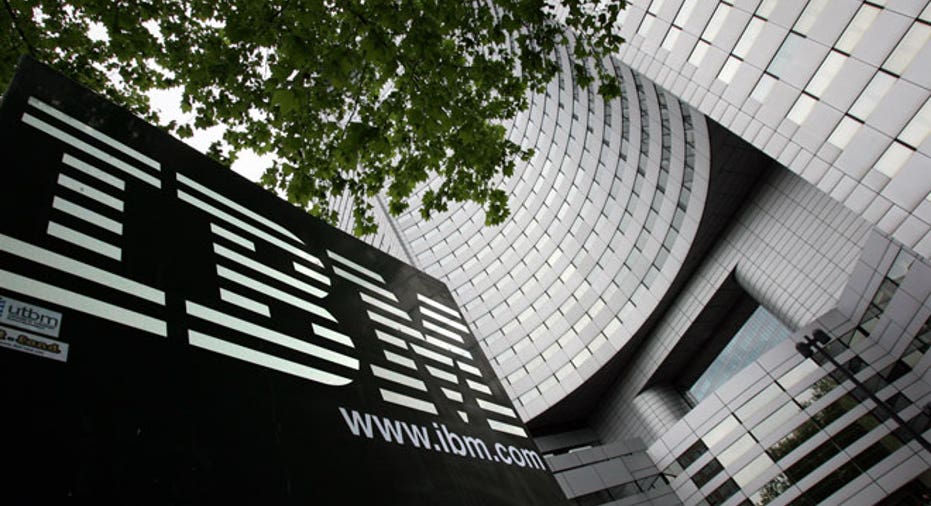Big Blue Reveals Another Revenue Decline

International Business Machines Corp. (NYSE:IBM) reported a 12% drop in revenue--the company's 12th straight quarter of year-over-year declines--hurt by the stronger U.S. dollar and decreases in its hardware business.
For the year, the company reiterated its estimate for per-share profit, excluding certain items, between $15.75 and $16.50. In the first quarter, the company's per-share earnings exceeded expectations.
Shares slid 0.4% to $165.50 in recent after-hours trading.
IBM is in the middle of a corporation reinvention that is starting to feel a lot like its early 1990s transition to a software and services company. The company is shedding unprofitable hardware businesses, as it pursues higher-margin fare in the realms of big data, security, cloud computing, and software and services for mobile devices.
Last year, these initiatives accounted for $25 billion, or 27% of annual revenue. IBM hopes they will grow to $40 billion, or 40% of revenue by 2018.
The computing pioneer, originally known for big mainframe systems announced deals last year to sell its commodity server business--System X business--to Lenovo Group Ltd. and pay Globalfoundries Inc. to take over IBM's semiconductor manufacturing business.
The company expects its hardware business to improve this year as it refreshes its mainframe and Unix computer systems, but IBM is facing a new generation of cloud-computing competitors. Analysts expect it to continue to struggle this year in services and software, UBS analyst Steven Milunovich said.
"Investors and users both see them on the wrong side of the fence when it comes to disruption," Mr. Milunovich said.
Big Blue also has been pushing sales of its Watson software. IBM's Watson data-mining technology has delivered high-profile results, famously winning at "Jeopardy!" in 2011, but the path to revenue has been slow.
IBM has unveiled several Watson-based efforts in recent months, most recently a partnership with Apple Inc., Johnson & Johnson and Medtronic Inc., to gather and analyze a flood of health-related personal information. Known as Watson Health, the alliance transfers IBM's experience in data processing to the health-care field, part of an evolving strategy to pool and analyze data from other companies, such as Twitter Inc. and the Weather Channel.
Overall, IBM reported a profit of $2.33 billion, down from $2.38 billion a year earlier. On a per-share basis, earnings rose to $2.35 from $2.29 on fewer shares outstanding. Excluding restructuring-related charges, retirement-related charges and other items, per-share earnings from continuing operations rose to $2.91 from $2.68.
Revenue decreased 13% to $19.59 billion. Excluding currency impacts and divested businesses, revenue was flat from a year ago.
Analysts polled by Thomson Reuters expected per-share profit of $2.80 and revenue of $19.64 billion.
Hardware revenue slumped 23% to $1.7 billion, but excluding the divestiture of the commodity server business and currency effects, sales increased 30%.
Global technology segment revenue declined 11% to $7.9 billion, but excluding divestitures and currency impacts fell 1%.
Software segment revenue dropped 8% to $5.2 billion, but excluding currency fluctuations declined 2%.
Global business services revenue decreased 13% to $4.3 billion, but excluding divestitures and currency impacts fell 4%.
As of February, IBM expected currency to hurt revenue growth by more than 7 percentage points, above the hit of 6 to 7 percentage points it projected in January. For the full year, IBM is expecting a foreign-exchange impact of more than 6 points, above previous projections for an impact of 5 to 6 points.
(By Tess Stynes and Robert McMillan.)



















